ERP for E-commerce: Definition, Features and Benefits
Discover how an ERP designed specifically for e-commerce can deliver retailers with operational efficiencies, data-driven business insights and more.

One recent study by Accenture found that 84% of C-level execs worldwide now see artificial intelligence (AI) as being key to meeting their growth goals. Expectations are rising accordingly for AI in e-commerce, especially as customer demands increase.
With the above in mind, we have prepared a guide on this fast-emerging and exciting field. We'll look at how artificial intelligence works in e-commerce operations, share some examples from well-known brands and retailers, and show you how to implement it successfully in your own company.
Artificial intelligence (AI) is a branch of computer science that aims to develop intelligent technologies with human-like cognitive abilities. AI processes large amounts of data and uses it to make predictions.
AI applications in e-commerce help brands, retailers and manufacturers to better understand the purchasing behavior of their customers and make more informed decisions regarding prices, product ranges and advertising messages.
In addition to analytical AI models that answer questions and solve problems, there is also generative AI (GenAI). Using complex algorithms, it interprets language and patterns in order to learn from the data and make decisions independently. Due to their great complexity, they are also referred to as large language models.
Well-known examples include Google Gemini, Dall-E and ChatGPT. Their analytical and creative capabilities help retailers to improve customer interactions and the overall customer experience by delivering personalized content and continuously optimizing business processes.
The breakthrough for AI in online retail came at the end of 2022 with ChatGPT: just a few months after its release, ChatGPT was being used by over 250 tech companies, almost 100 service providers and 35 online retailers - so AI is also becoming increasingly important in e-commerce.
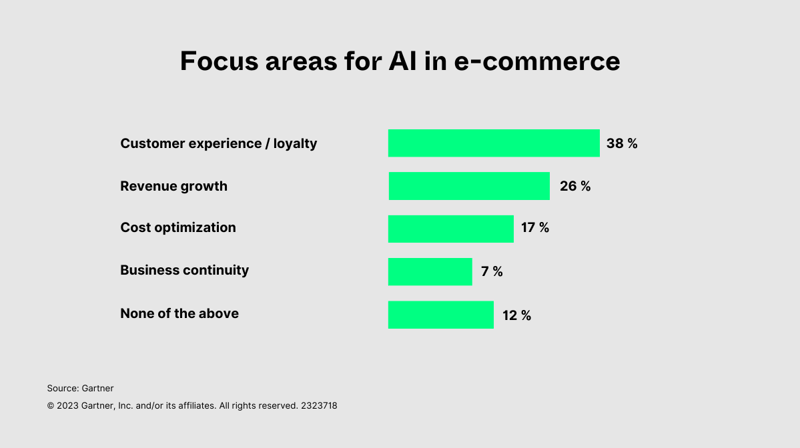
The figures also show how fast-moving the technology is. To keep up, retailers need a tech setup that can easily adapt to changes and seamlessly integrate AI tools into the existing IT landscape - like Actindo Core1, a powerful and flexible commerce ERP platform.
Starting already to think about AI in e-commerce is worthwhile: large e-commerce providers and start-ups are equally using algorithms to optimize their customer journey and internal workflows, further develop their business models and offer a positive customer experience (CX) in order to stay attractive to customers.
Thanks to digitalization and providers such as OpenAI, AI can now be used by all companies. IDC forecasts annual growth of around 73 percent to USD 143 billion for GenAI investments by 2027.
According to Gartner, the drivers are CX improvements and stronger customer loyalty. 48% of companies see CX optimizations as one of the most important AI benefits. Customer care in particular benefits from this: virtual assistants ensure efficiency at the interface between customer service and sales, and reduce the workload of service employees.
What are the specific benefits of AI for e-commerce companies? In short, AI enables brands, retailers and manufacturers to use vast amounts of data to make better decisions, optimize processes and ultimately increase sales.
With AI, e-commerce leaders are also securing important competitive advantages for their companies - primarily through machine learning (ML). Thanks to this technology, AI systems can independently perform real-time analyses and create highly accurate forecasts. This is where AI shines by predicting trends and demand.
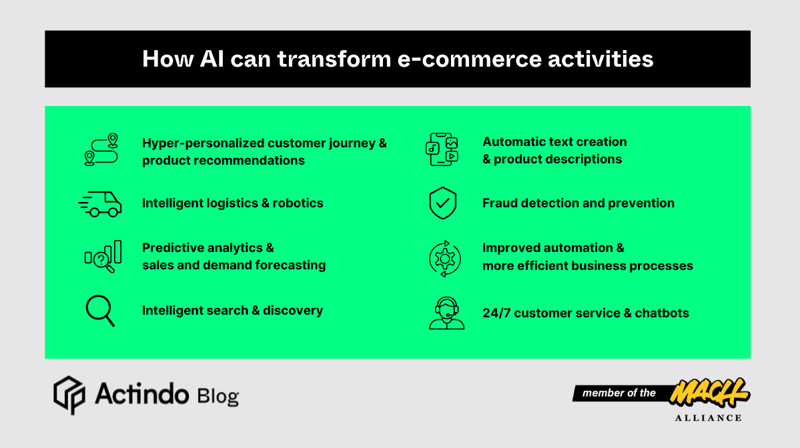
By analyzing customer data and making AI-based optimizations within seconds, brands and retailers can achieve:
By automating daily business processes and tasks, e-commerce companies can also free up their employees for higher value activities such as strategic planning and business development. This in turn leads to increased productivity, reduced costs and more efficient processes overall.
The following examples of AI in e-commerce show how online retailers can benefit from machine learning and GenAI:
Chatbots can answer customer questions around the clock, simplify product searches, collect feedback and relieve customer service. Fashion retailer Zalando also uses chatbots as fashion assistants that offer fashion advice and simplify purchasing decisions.
However, just 18 percent of the largest German online stores currently use chatbots. This figure should increase in the future, as the market could reach a volume of USD 1.25 billion by 2025 due to the progress of AI.
Research firm Gartner estimates that chatbots will become the most important customer service channel in one in four organizations by 2027.
A recent study by Actindo and YouGov provides exclusive insights into what chatbots will have to achieve in the future:
How important to you are the following capabilities of AI chatbots for customer service inquiries about an online purchase?
Operating various e-commerce channels while optimally planning stock levels and managing returns is a challenging task, especially during peak periods such as Black Friday.
Which is why German retailer Otto deployed its own deep learning algorithm to reduce the returns rate, by analysing customer feedback and anticipating which items are most likely to be returned.
The faster customers can find what they're looking for, the faster e-commerce sales increase. Beauty products retailer Flaconi, for example, has increased its average order value by ten percent by introducing intelligent search technology.
Powerful search & discovery functions are essential for webshops. However, onsite search in e-commerce must be able to compete with the likes of Amazon and Spotify and reflect changing search habits - because AI assistants such as Alexa and ChatGPT are making search terms more complex and dialog-oriented.
Off-the-shelf marketing and standardized content are out. Young people in particular want personalization in e-commerce: 57% of 18 to 42-year-olds expect personalized shopping experiences in the future.
Swedish payments platform Klarna is developing AI technologies for personalized shopping in order to align products and shoppers' interests.
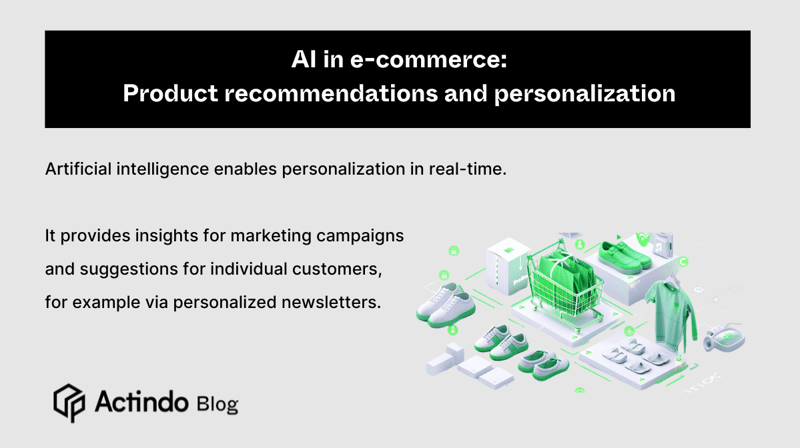
In addition to smooth back-end processes, visual experiences contribute to sales growth in e-commerce. Until now, however, content production in retail has been associated with high effort and costs. Amazon therefore offers its Marketplace sellers a generative AI tool for product descriptions as support.
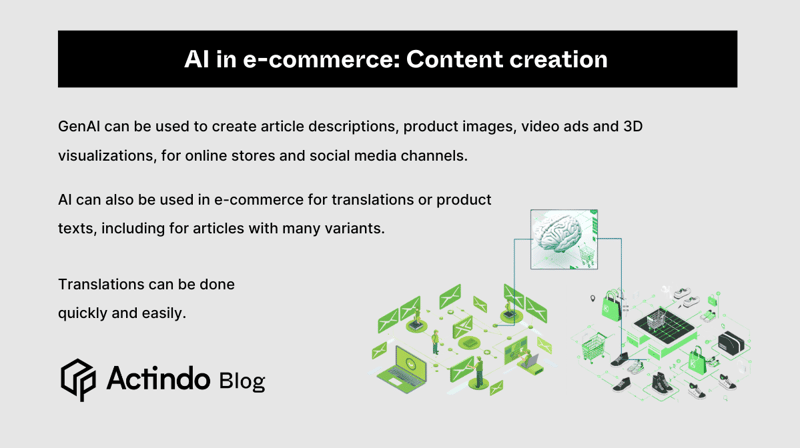
The analyst firm Gartner has named generative artificial intelligence as one of the most important strategic technology trends for 2024. By investing in AI now, e-commerce companies can position themselves as industry leaders and gain a competitive advantage in their markets.
Furthermore, the earlier e-commerce companies start implementing AI, the more data they can collect and analyze over time, giving them an even greater advantage in the long run.
In addition, AI can help growth-oriented online retailers to navigate through an increasingly complex market environment. With so many channels to choose from, it becomes easier to decide where to best allocate resources and which platforms to prioritize by analyzing data and providing clear strategy recommendations.
Do you want to get started with AI as quickly and easily as possible? Then it's important to overcome technological hurdles first.
The biggest blockers to innovation are outdated e-commerce systems. They are neither open nor flexible enough to connect and scale AI applications. In addition, access to data from various e-commerce channels is often limited and prevents AI tools from being able to exploit their analytical strengths.
As AI systems develop rapidly, the most important prerequisite for AI transformation in e-commerce is therefore a flexible, scalable and open IT infrastructure. This enables retailers to:
The MACH architecture promotes the integration of AI in e-commerce by providing flexible APIs that enable rapid customization and automation. This allows companies to effectively use AI solutions to collect and optimize data.
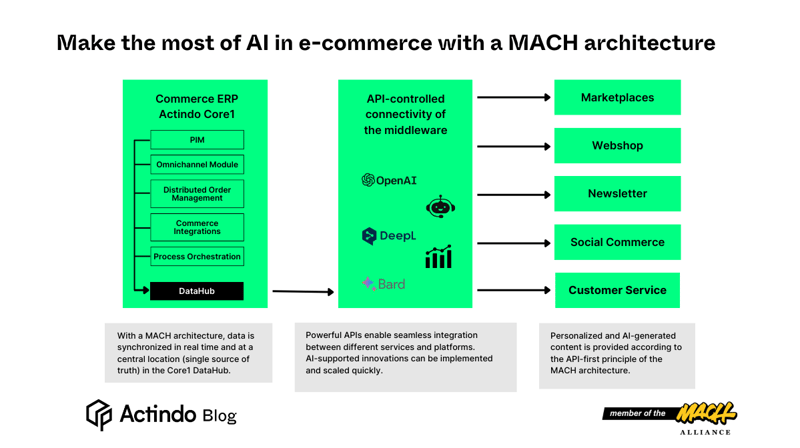
Actindo's composable commerce ERP system, which is based on the MACH architecture, offers all of this. Microservices, APIs, cloud technology and a headless approach allow retailers to quickly adapt business processes so that they can react flexibly to trends such as AI without burdening their development resources.
Entering the AI era presents e-commerce companies with a few hurdles that they can easily overcome with Actindo at the heart of their tech setup:
The IT landscape in e-commerce is characterized by monolithic systems. However, AI requires agile and scalable platforms, for which Gartner has coined the term "composable commerce". These systems can orchestrate processes and best-of-breed applications in a centralized environment.
Actindo Core1 has been part of the MACH Alliance since 2021 and was one of the first commerce ERP systems to be MACH-certified.
Normally, the implementation of AI applications in classic store systems is expensive and cumbersome. With the MACH architecture, however, the integration and adaptation of AI measures is completed quickly.
This saves IT managers time and money and conserves valuable IT resources. There's also good news for data protection officers: the Actindo Core1 platform is developed and hosted in Germany, and meets the highest security standards.
Actindo offers numerous out-of-the-box features. Nevertheless, the platform is flexible enough to adapt to the needs of e-commerce companies and their channels. AI chatbots or translation tools can be implemented via low or no code, for example. This means that you can try out new AI trends more quickly and change processes again.
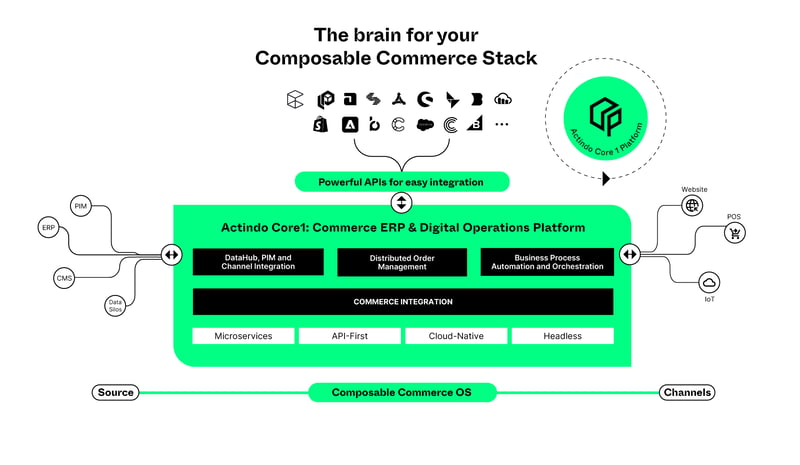
Actindo provides AI models with sufficient learning material so that they can be deployed quickly: a central data hub provides product and customer data centrally. AI tools can use this data to derive recommendations for effective marketing campaigns or strategic decisions. ETL functions (extract, transform, load) ensure that the AI uses standardized data from different sources.
Moreover, AI solutions pay for themselves quickly if they are scalable: Companies that have scaled with AI achieve a threefold return on their AI investments.
Three out of four executives believe that companies need to invest in AI if they don't want to be left behind in the next five years. If you start now, you can position yourself for the future and help shape the change in e-commerce.
With Actindo's AI expertise from numerous e-commerce projects, you can prepare your processes for the next stages of the AI evolution. Until then, you can master current challenges such as personalization with AI support. Actindo provides the technological basis that strengthens your competitive position and can even improve it.
Discover how an ERP designed specifically for e-commerce can deliver retailers with operational efficiencies, data-driven business insights and more.
Learn everything you need to know about Composable Commerce, and how it can transform your e-commerce strategy in 2024. Read our blog for more...
Get started with direct sales in e-commerce: learn all about the benefits, best practices and technical setup.